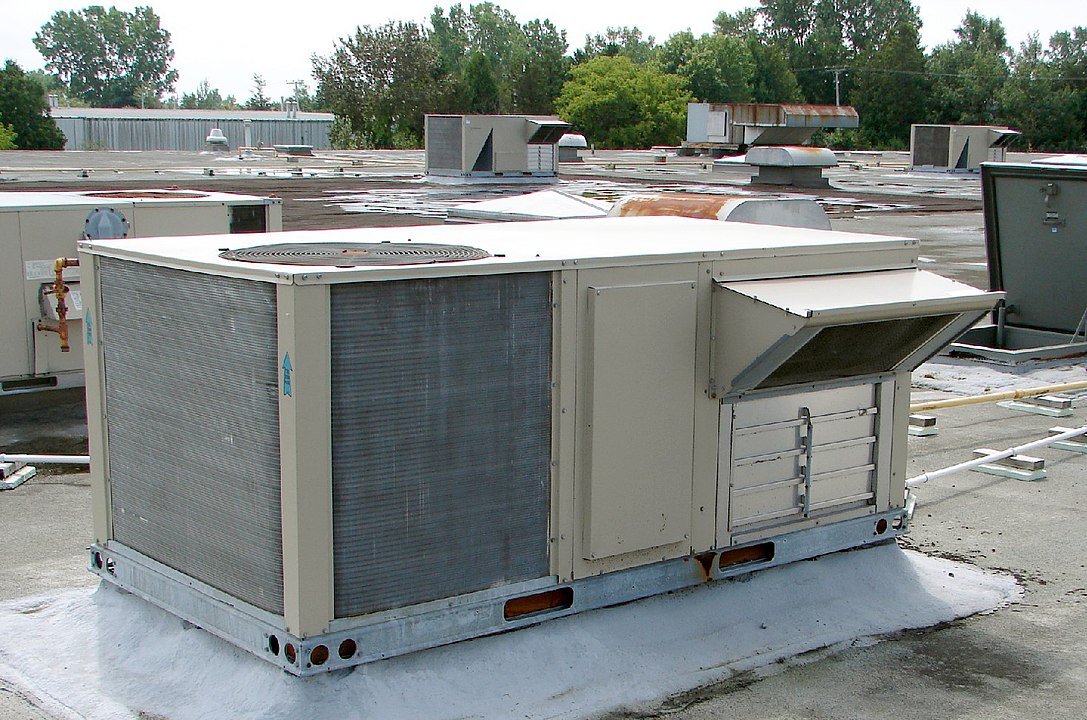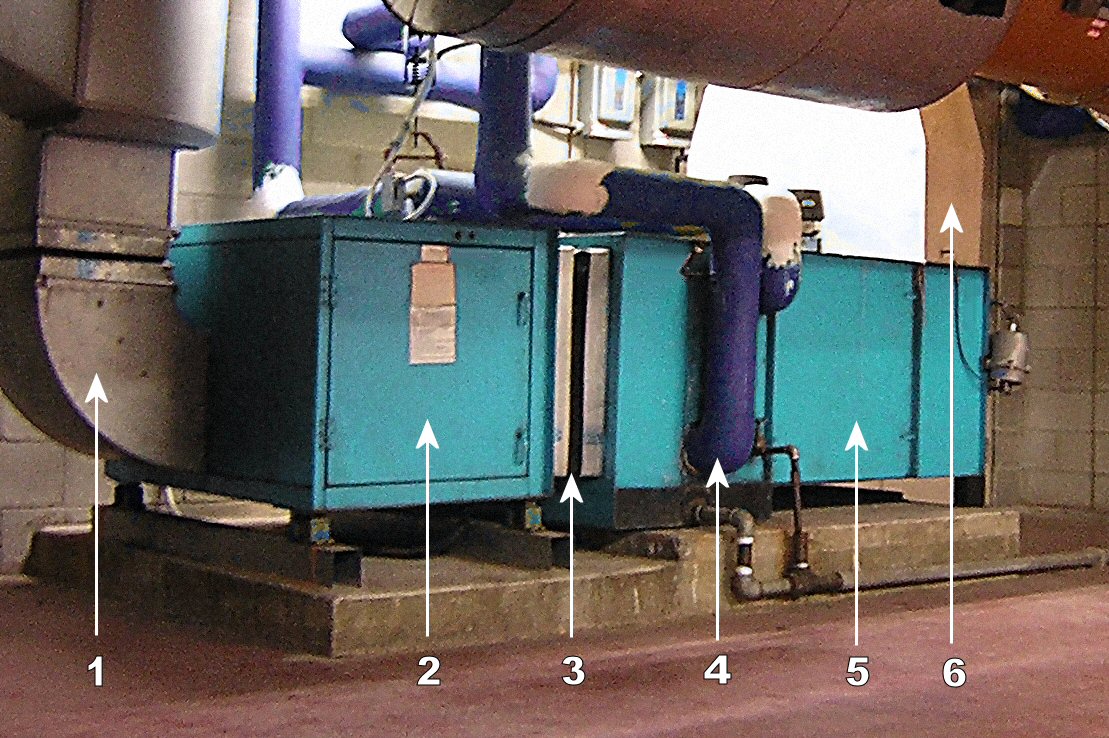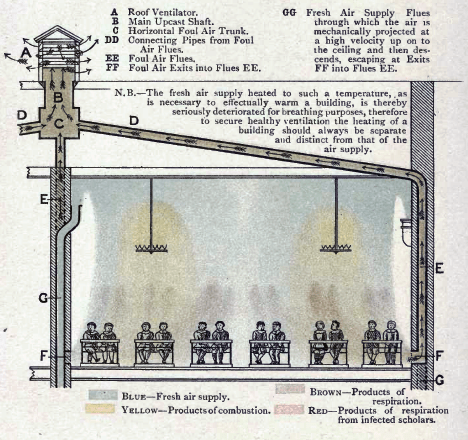HVAC systems are the foundation of modern living in maintaining a harmonious balance of temperature and air quality in our houses. These systems, which include heating, ventilation, and air conditioning devices, are critical in establishing a comfortable and healthy living environment regardless of the outside weather. The importance of HVAC systems is especially notable in situations when you may meet concerns such as a “hot water system beeping,” signifying a need for attention.
Understanding Your HVAC System
Gaining a fundamental understanding of your HVAC (Heating, Ventilation, and Air Conditioning) system is crucial for maintaining a comfortable and efficient home environment. Here’s a brief overview of what homeowners should know about their HVAC systems.
Key Components of an HVAC System
Thermostat: This is the control center of your HVAC system, allowing you to set the desired temperature and control when the heating or cooling units turn on and off.
Furnace: The furnace is the most significant component of your HVAC system, responsible for heating air which is then distributed throughout your home.
Heat Exchanger: Located within the furnace, the heat exchanger activates when the furnace is on and warms the air that passes over it.
Air Conditioner: Working in tandem with the furnace, the air conditioner cools the air and helps maintain a comfortable temperature during warmer months.
Ductwork: This network of tubes in the walls and floors channels heated or cooled air into different rooms.
Vents: These are the outlets from which the heated or cooled air is expelled into the various rooms of your home.
Evaporator Coil: This component cools the air when your thermostat sets the air conditioning to lower temperatures.
Condensing Unit: Attached to the evaporator coil, this unit (usually located outside the home) releases heat from the air conditioner.
How It Works
Heating Process:
When the thermostat signals the furnace to heat, the heat exchanger heats up, and the furnace’s blower fan circulates this warmed air through the ductwork and into the rooms of your home.
Cooling Process:
For cooling, the air conditioner’s evaporator coil removes heat from the air, and this cooled air is then pushed through the ductwork by the blower fan.
Decoding Strange Sounds
Understanding and addressing strange sounds emanating from your HVAC system is crucial for maintaining its efficiency and longevity. These sounds often serve as early warning signs of potential issues. Here’s a guide to decoding some of the common strange sounds and what they might indicate.
Hot Water System Beeping
A beeping hot water system is a crucial warning that homeowners should not ignore, as it frequently indicates an underlying problem that requires quick care. This audible signal can indicate a variety of faults, from simple ones like a low battery in digital versions to more major concerns like overheating, pressure imbalances, or even system leakage.
In gas-powered units, it could also warn of a potential gas leak, which is a significant safety hazard. Promptly identifying and correcting the reason for the hot water system beeping, whether through basic troubleshooting or professional assistance, is critical for guaranteeing the safe and effective operation of the hot water system, as well as the general safety and comfort of the home.
Common Causes
System Malfunctions: The most common reason for a beeping hot water system in an HVAC setup is a malfunction within the system. This could be due to a variety of issues, such as a failing heating element, a malfunctioning thermostat, or electrical problems within the unit.
Pressure Issues: If the pressure within the hot water system becomes too high, it can trigger a safety feature that causes the system to beep. This is a critical issue as excessive pressure can pose a risk of leaks or bursts.
Temperature Fluctuations: Similar to pressure issues, abnormal temperature readings – either too high or too low – can cause the system to beep. Overheating is a particular concern, as it can damage the system and pose safety risks.
Leak Detection: Some HVAC systems with integrated hot water components have sensors to detect water leaks. If a leak is detected, the system may beep to alert the homeowner. Leaks can lead to water damage and affect the efficiency of the system.
Low Battery in Digital Controls: In systems that use battery-powered controls or sensors, a low battery can trigger a beeping sound. This is a simple fix but an important one to ensure the controls function correctly.
Gas Leaks: In HVAC systems that use gas-powered hot water heaters, a beeping sound could indicate a gas leak, which is a serious safety hazard and requires immediate attention.
Recommended Actions
When facing beeping issues in your hot water system within an HVAC setup, taking the right actions is crucial for safety and system integrity. Here are some recommended steps to address these issues.
To begin, see the system’s user handbook. Many HVAC systems include specific beep codes or sequences that can aid in the diagnosis of a problem. Examine the area for visible signs of leaks, overheating, or damage. Ensure that all connections are secure and that no loose components exist.
Check the system’s pressure and temperature readings, if available, to ensure they are within normal levels. Overheating or high pressure can be dangerous and should be treated right away. Replace the batteries in any battery-powered controllers or detectors to check if the beeping stops. Resetting the system can sometimes clear erroneous alarms. Turn off the unit, wait a few minutes, and then re-energize it.
Clanking and Banging in HVAC Systems
Clanking and banging sounds emanating from an HVAC system are not just disruptive; they are indicative of potential internal problems that need immediate attention. These sounds typically occur when there are loose or misaligned components within the system.
Common Causes
Loose Parts: Over time, parts within the HVAC unit, like screws, bolts, or other metal components, can become loose due to regular wear and tear. When the system operates, these loose parts can move around, causing clanking or banging noises.
Blower Motor Issues: If the blower motor is unbalanced or its components are failing, it can produce a banging sound. This is often due to strain on the motor’s bearings or misalignment of the blower wheel.
Ductwork Expansion and Contraction: Sometimes, the noise may not be from the HVAC unit itself but from the ductwork. As air flows through, changes in temperature can cause the ducts to expand or contract, leading to banging sounds, especially if the ducts are improperly sized or installed.
Debris in the System: Occasionally, debris or small objects can find their way into the HVAC system, especially the outdoor units. These foreign objects can cause clanking sounds as they get tossed around during operation.
Recommended Actions
When you first notice these sounds, it’s advisable to turn off the system and perform a visual inspection, if possible, to identify any obvious loose parts or debris.
Due to the complexity of HVAC systems, it’s often best to call a professional technician to inspect and repair the issue. They can accurately diagnose the problem, tighten or replace loose components, and ensure the system operates smoothly.
Regular maintenance by a professional can prevent these issues from occurring in the first place. Scheduled check-ups can identify and fix minor issues before they lead to major problems.
Squealing and Screeching
Squealing and screeching noises from an HVAC system can be alarming and are often indicative of issues with the system’s belts or motor bearings. These sounds typically occur when the system starts up or is running.
Common Causes
Worn or Loose Belts: In some HVAC systems, especially older models, belts are used to connect the motor to the blower. Over time, these belts can wear out, become loose, or misaligned, leading to a squealing sound.
Faulty Motor Bearings: The blower motor in your HVAC system has bearings that help reduce friction as the motor spins. If these bearings are failing or lack proper lubrication, they can emit a high-pitched screeching noise.
Recommended Actions
If you notice a squealing or screeching sound, it’s advisable to inspect the system if you’re comfortable doing so. Check for any visible signs of wear on the belts.
More often than not, these issues require the expertise of a professional HVAC technician. They can accurately diagnose the problem, replace worn belts, lubricate motor bearings, or undertake any other necessary repairs.
Regular maintenance of your HVAC system can prevent these issues from developing. Technicians can identify and rectify minor issues during routine check-ups before they escalate into major problems.
Rattling and Vibrating in HVAC Systems
Rattling and vibrating sounds from an HVAC system can be unsettling and are often signs of underlying issues that need attention. These sounds typically indicate loose components or obstructions within the system.
Common Causes
Loose Panels or Screws: Over time, screws and panels on the HVAC unit can become loose due to the system’s regular operation and vibrations. This loosening can lead to rattling noises, especially when the system cycles on or off.
Ductwork Issues: Rattling sounds may also originate from the ductwork. Loose or poorly secured ducts can vibrate, especially when air flows through them at high speeds.
Debris in the System: Outdoor units are particularly susceptible to accumulating debris like leaves, twigs, or gravel. These materials can cause vibrating or rattling sounds as they interfere with the fan or other moving parts.
Worn Out Components: Certain internal components, such as the blower motor or fan blades, can wear out over time. If these parts become unbalanced, they can cause the entire unit to vibrate or rattle.
Recommended Actions
Check for any visible loose screws or panels and tighten them. Also, inspect the outdoor unit for debris and clear it away if necessary. If the noise seems to be coming from the ducts, inspect them for any signs of looseness or damage. Secure any loose sections and consider insulating ducts to reduce noise.
If the problem persists or you’re unable to locate the source of the noise, it’s advisable to contact a professional HVAC technician. They can conduct a thorough inspection, identify the root cause, and perform necessary repairs or adjustments.
Humming and Buzzing in HVAC Systems
Humming and buzzing noises from an HVAC system, while often less disruptive than other sounds, should not be overlooked. These sounds can indicate electrical issues that, if not addressed, could lead to more significant problems.
Common Causes
Electrical Issues: A constant humming sound might suggest electrical problems, such as a failing motor, a malfunctioning contactor relay switch, or issues with the capacitor. These components are crucial for the efficient operation of the HVAC system.
Loose Parts: Sometimes, the buzzing or humming noise can be due to loose parts or panels in the unit. Vibrations during operation can cause these parts to produce a buzzing sound.
Refrigerant Leaks: In some cases, a buzzing sound can indicate a refrigerant leak. This is particularly serious as it not only affects the system’s efficiency but can also be harmful to the environment.
Frozen AC Unit: If the air conditioner unit is frozen, it might emit a humming sound. This can occur when the system is overworked or there is a lack of adequate airflow.
Recommended Actions
Regular maintenance checks can often catch and resolve these issues before they develop into serious problems. If you suspect an electrical issue, it’s safest to turn off the system to prevent further damage or hazards. Due to the complexity and potential risks of electrical components in HVAC systems, it’s advisable to have a professional technician diagnose and repair the issue. Technicians can ensure electrical connections are secure and components like the capacitor and contactor are functioning correctly.
Investigating Unusual Smells in HVAC Systems
Unusual smells emanating from an HVAC system can be more than just a nuisance; they often signal underlying issues that require immediate attention. Understanding and addressing these odors promptly can prevent potential health risks and system damage.
Musty and Moldy Odors in HVAC Systems
Musty and moldy odors emanating from an HVAC system are common indicators of mold or mildew growth within the system. These odors are not just unpleasant; they can also pose health risks, particularly for individuals with allergies or respiratory issues.
Common Causes
Moisture Accumulation: The primary cause of mold and mildew in HVAC systems is excess moisture. This can occur in the ductwork, within the air conditioning unit, or around the evaporator coils.
Clogged Drain Lines: When the HVAC system’s drain lines are clogged, water can back up, creating a damp environment conducive to mold growth.
Dirty Air Filters: Over time, air filters can become clogged with dust and debris. If not changed regularly, they can harbor mold spores and contribute to the spread of mold in the system.
Recommended Actions
Inspect the HVAC system for visible signs of mold. Cleaning the affected areas, such as the evaporator coils, drain pan, and ductwork, is crucial. In cases of extensive mold growth, professional cleaning may be necessary.
To prevent mold growth, ensure that the HVAC system’s drain lines are clear and that the air filters are changed regularly. Maintaining optimal humidity levels in your home also helps in preventing mold growth.
If you suspect a mold issue but cannot find the source, or if the problem persists, it’s advisable to seek a professional HVAC technician’s assessment. They can identify hidden mold, clean hard-to-reach areas, and suggest improvements to prevent future growth.
Burning Smells in HVAC Systems
A burning smell emanating from an HVAC system can be alarming and is often a sign of a potentially serious issue. It’s important to address this promptly to prevent damage to the system and ensure safety.
Common Causes
Dust Accumulation: When heating systems are turned on after a period of inactivity, accumulated dust can burn off, producing a burning smell. This is usually temporary and harmless.
Overheating Components: If motors or other components overheat due to malfunction or excessive strain, they can emit a burning odor. This is more serious and requires immediate attention.
Electrical Issues: Faulty wiring or failing electrical components can produce a distinct electrical burning smell. This poses a significant fire hazard and should be addressed immediately.
Foreign Objects in Ducts or Vents: Occasionally, small objects or debris in the ductwork can heat up and emit a burning smell when the system is in operation.
Recommended Actions
If a burning smell is detected, turn off the system immediately to prevent further damage or risk. Check for visible signs of overheating, such as discoloration on the unit or burnt components. Also, inspect the air filters and replace them if they are clogged.
Regular maintenance, including professional inspections and cleaning, can prevent many causes of burning smells by ensuring the system operates efficiently and safely.
Rotten Egg Smell in HVAC Systems
A rotten egg smell emanating from an HVAC system, especially in systems that use natural gas, is a serious concern. This distinct odor is often added to natural gas, which is otherwise odorless, as a safety measure to alert occupants of a gas leak.
Common Causes
- Gas Leak: The most alarming cause of a rotten egg smell is a gas leak. This can occur in gas-powered HVAC systems due to issues like a cracked heat exchanger, loose connections, or damaged gas lines.
- Decomposing Organic Matter: In some cases, particularly in systems without gas, this smell could be due to decomposing organic matter in the ducts or near the HVAC unit.
Recommended Actions
If you detect a rotten egg smell and suspect a gas leak, it is crucial to act immediately. Do not attempt to locate the leak yourself. Ensure the safety of all occupants by evacuating the area. Avoid using any electrical switches, appliances, or anything that could ignite the gas.
Once safely outside, contact your gas company or emergency services to report the leak. They have the necessary equipment and expertise to handle the situation safely.
After the immediate danger is addressed, have a professional HVAC technician inspect and repair your system. They can identify and fix the source of the leak or any other issues related to the odor.
Regular inspections and maintenance of your HVAC system, particularly if it’s gas-powered, can help prevent leaks and other issues. Installing carbon monoxide detectors in your home can provide an additional layer of safety, alerting you to the presence of harmful gases.
Oily or Greasy Smells in HVAC Systems
An oily or greasy smell emanating from an HVAC system can be indicative of a mechanical issue within the unit. While not as immediately dangerous as a gas leak, this type of odor should not be overlooked, as it can signal a problem that may affect the system’s efficiency and longevity.
Common Causes
Oil Leaks: In some HVAC systems, particularly those that are older or heavily used, oil leaks can occur. These leaks might stem from the compressor or other moving parts that require lubrication for smooth operation.
Overheated Components: Sometimes, the smell might be due to components overheating, causing lubricants or insulating materials within the system to emit an oily or greasy odor.
Recommended Actions
Check around the HVAC unit for any signs of oil leakage. This might include oil spots or a noticeable accumulation of grease around certain components. If an oil leak is suspected, it’s advisable to turn off the system and contact a professional HVAC technician. Also regularly replacing air filters can prevent the system from overworking, which can reduce the risk of overheating and related smells.
Chemical Odors in HVAC Systems
The presence of chemical odors emanating from an HVAC system is a cause for concern and warrants immediate investigation. These smells can vary but often resemble the scent of formaldehyde, chloroform, or other industrial solvents.
Common Causes
Refrigerant Leaks: One of the most common sources of chemical odors in HVAC systems is a refrigerant leak. Refrigerants, which are vital for the cooling process, can emit a strong chemical smell if they leak from the coils or refrigerant lines.
Off-gassing from New Components: Sometimes, newly installed HVAC components or ductwork can release chemical odors due to the off-gassing of volatile organic compounds (VOCs) in new plastics or insulation materials.
Overheating Plastic Components: Overheating within the HVAC system can cause plastic components to emit a chemical odor. This may indicate an electrical issue or a malfunctioning part.
Recommended Actions
If you detect a strong chemical odor, turn off your HVAC system to prevent further circulation of potentially harmful fumes. If the smell coincides with a new installation, ensure proper ventilation in your home. The odor may dissipate over time, but if it persists, consult with the installation technician.
Regularly scheduled maintenance can help detect and address issues like refrigerant leaks early on. Using high-quality air filters can help reduce the circulation of odors and improve indoor air quality.
Conclusion
Recognizing and addressing the red flags in your HVAC system, particularly strange sounds and unusual smells, is crucial for maintaining a safe and efficient home environment. These auditory and olfactory signals often indicate underlying issues ranging from minor maintenance needs to serious safety hazards.
Understanding what these signs might mean – be it a hot water tank beeping, a musty odor indicating mold, or a rattling noise suggesting loose components – empowers homeowners to take timely action. Whether it involves simple troubleshooting or calling in a professional, responding promptly to these warnings not only ensures the longevity of your HVAC system but also safeguards the comfort and well-being of your household. Remember, a well-maintained HVAC system is key to a comfortable, healthy, and safe home.



